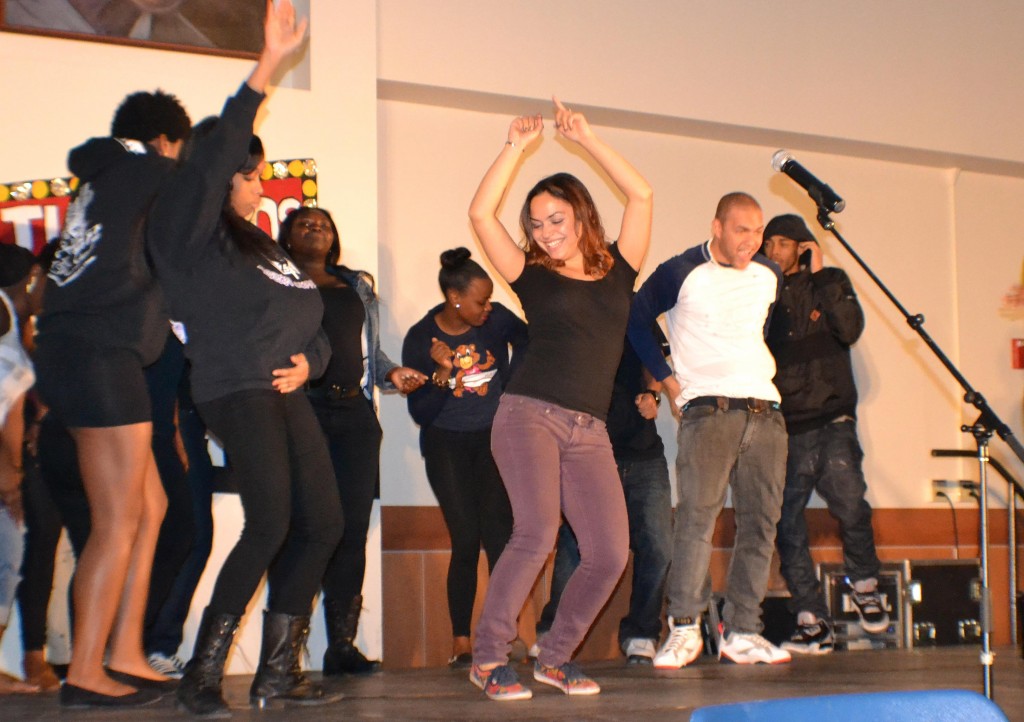
On Saturday night, JUMP Nation, an organization that pairs underprivileged middle schoolers with Binghamton University students, hosted its annual banquet in the Old University Union’s Mandela Room to celebrate their 21st anniversary as an active club.
Each spring, the Juvenile Urban Multicultural Program (JUMP) brings approximately 70 eighth-grade students to the University from underprivileged neighborhoods in both Binghamton and New York City, where they are often facing socioeconomic barriers and a lack of positive role models.
BU students host and mentor visiting students, called protégés, for four days in the dormitories during “JUMP weekend.” Protégés stay free of charge, get accustomed to college life and attend workshops to educate them about the benefits of a college education.
Lindsay Horne, co-chair of JUMP’s mentoring committee, first hosted a protégé her freshman year, along with her roommate. She said that JUMP mentors relate to the protégés because many of them come from similar backgrounds.
“We focus on at-risk students and they may not live in the best neighborhood, and they may not have the support from their families that they should,” said Horne, a senior double-majoring in economics and sociology. “We just stress that there’s always somebody that’s going to be there for you.”
Horne said they want to send protégés the message that “if I can do it, so can you.”
“At the end of every weekend, we kind of have a recognition for the students who participated in the program, both Binghamton students and protégés,” Horne said.
The recognition ceremony gives protégés and mentors a chance to go on stage and talk about their experience.
“I remember [my protégé] said that she felt like I was her big sister and she was really happy to be my protégé,” Horne said.
JUMP treasurer Girelis Guzman, a junior majoring in graphic design, said she was moved by a protégé’s speech during one ceremony.
“One protégé said ‘I want to thank JUMP Nation for what they taught me. Before this program I never really thought I had a chance of going to college, but now since I have been here I know I can make it,’” Guzman wrote in an email. “I will always remember this because it was something that pushed me to run for a position on the executive board.”
The program stresses a five-year commitment from mentors to keep in touch with protégés throughout high school.
JUMP President Habibatou Magassa, a senior majoring in comparative literature, has been involved with the program since her freshmen year when she hosted three protégés, with whom she still keeps in touch.
“They will be graduating soon and Christine [a protégé] is talking about applying to Binghamton,” Magassa wrote in an email. “I am proud of each of them and can’t wait until they reach college.”
Magassa said she is committed to the JUMP program because it means a lot to her.
“I have love and passion for this cause that it is now near and dear to my heart,” Magassa wrote. “The sleepless nights, three-hour Executive Board meetings, moments of laughter, and accumulated stress have all been worth the successes of our events, the happiness of our general body members and the tears of our protégés as they return home Sunday morning from the weekend.”
JUMP weekend costs the group about $15,000, $13,000 of which comes from the Student Association. Additional funding comes from bake sales, donations from alumni and other annual events.
Nearly 250 people attended Saturday’s banquet, which raised about $700 for JUMP. The banquet included food served by members of Alpha Phi Omega fraternity and featured performances from the X-Fact’r Step Team and Black Dance Repetoire.
Guzman said she hopes more students will become JUMP mentors and recognize the importance of helping underprivileged youth.
“Knowing that I was a part of a program that influences inner city youth to pursue higher education is something that is important to me,” Guzman wrote. “I also want to encourage others to participate in the program in order for our youth to get out of the streets and get an education.”
She said that mentors can make a real difference in the lives of the students they host.
“The message I would like to send to BU students is that they have the power to change someone’s life through mentoring and overall being a positive role model,” Guzman said.
— Christina Pullano contributed to this report.


